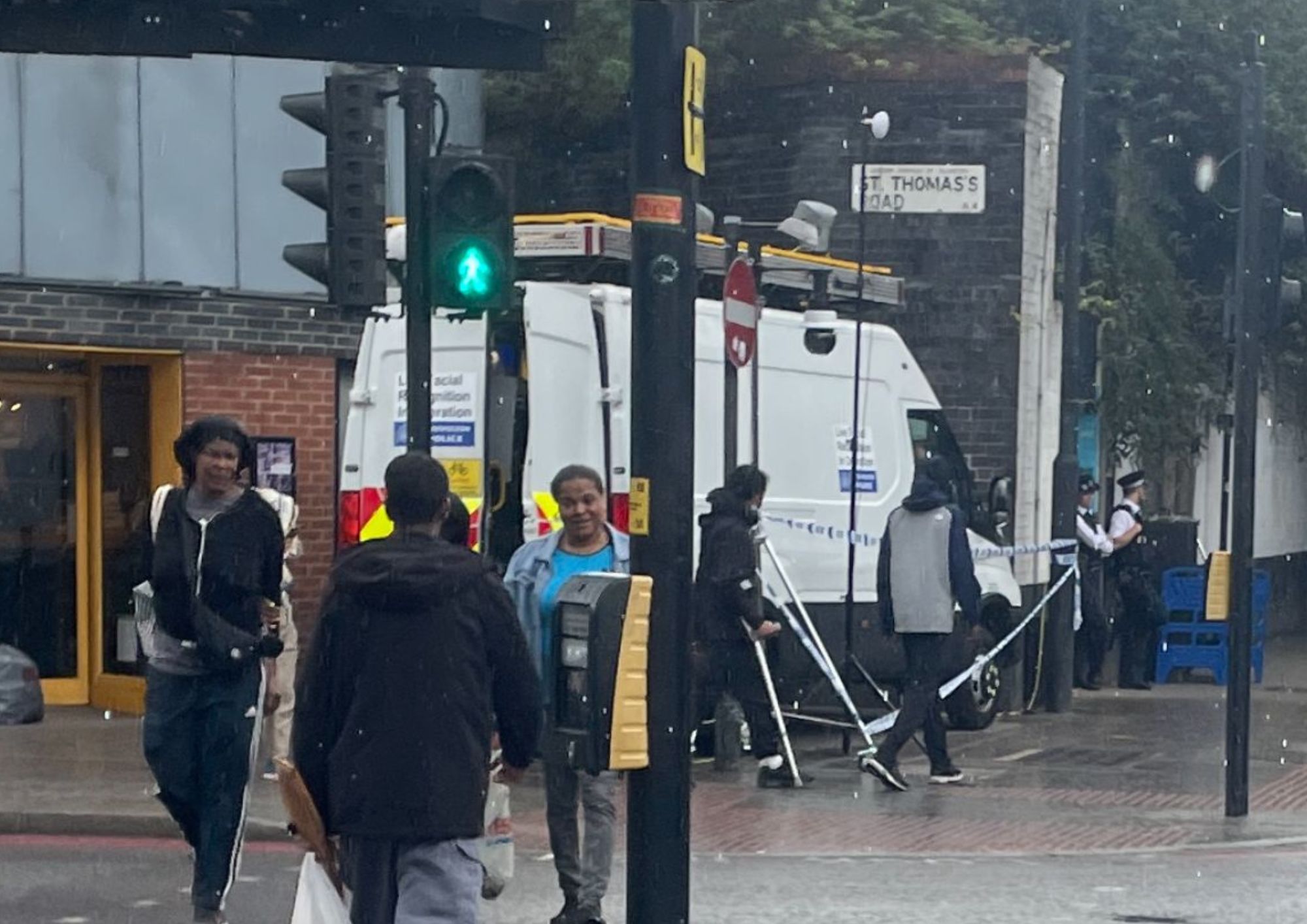Face recognition cams make us ‘walking barcodes’
Councillors fuming as police ignore opposition to 'Orwellian' tech
Friday, 12th September 2025 — By Isabel Loubser

The van parked up in Finsbury Park
POLICE have defied the council by using live facial recognition (LFR) technology in Finsbury Park this week, a year after councillors unanimously voted to oppose its use.
The Met were told to cancel their “Orwellian” tactics in the borough in a Town Hall motion.
But in what has this week been privately described as a “breach” and a “betrayal”, officers installed a van close to Finsbury Park station and mosque on Tuesday to surveil those walking past.
The move was labelled as “extraordinary” by Green councillor Caroline Russell, who also chairs the Police and Crime committee in the London Assembly.
“It is really worrying to see the Met be so cavalier with their relationship with democratically-elected representatives and the community”, she said.
“This does not bode well for the Met’s desire to maintain and rebuild trust and confidence in their policing.”
Cllr Russell added: “What does policing by consent mean if the cross-party democratically elected representatives of the people in Islington voted to say no to the use of LFR and the Met have overruled that apparently without any consultation, discussion or engagement with the community that is being exposed to this intrusive and chilling technology?”
Madeleine Stone, senior advocacy manager at Big Brother Watch, a privacy campaigning organisation, said the decision to defy the council was “alarming”.
“It is incredibly disappointing, undemocratic and it shouldn’t be happening”, she told the Tribune.
“Unfortunately, because LFR is virtually unregulated in this country, the police have been able to use this in a completely undemocratic way. There has never been a vote [in parliament] on its use, and it is not mentioned in any laws.”
Ms Stone warned that the technology turns people into “walking barcodes” that can be biometrically scanned and identified.
“It is incredibly dangerous for such a novel and intrusive new form of surveillance and there are real concerns around discrimination,” she added.
Several studies have shown that the technology used at certain settings is less accurate for identifying women and people of colour.
“It is totally unacceptable that when the Met have such finite resources and they so desperately need to rebuild trust with the black community, they are investing in technology that has potential to be so discriminatory,” Ms Stone said.
Finsbury Park ward councillors expressed their “extreme disappointment” about not being informed that the tech was to be used.
“It wasn’t run by me and I’m a councillor in that ward,” said Councillor Gary Heather.
“Unless there were very good reasons for using it, it is damaging to trust in the police, trust in the council, and community cohesion.”
Representatives from Finsbury Park Mosque confirmed to the Tribune that a police officer had visited the mosque on Friday to ask whether they could park their van outside.
According to the mosque, police officers did not explain the nature of the operation.
Questions have been raised over how the Met select locations to deploy the technology, with several councillors demanding answers for why the live facial recognition van was stationed in Finsbury Park as opposed to elsewhere.
“The fact they have decided to deploy it near a mosque is extremely alarming”, said Ms Stone.
“The Met’s own policy recognises that deploying this technology outside a place of worship can have a chilling effect on people’s ability to freely express their religion.”
Councillor Angelo Weekes, the council’s community safety chief, did not answer the Tribune’s questions about whether the council knew about the use of the technology in advance, whether they had facilitated the use, or alerted any community groups in Finsbury Park.
Instead, he released a statement saying that the council “stands firm” in its opposition to LFR, adding that he had written to the borough commander to highlight his “disappointment”.
He added, however, that, “the police have complete autonomy and therefore do not require our permission as a local authority to deploy in the borough”.
A spokesperson for the Metropolitan Police said: “The Met is committed to making London safer, using data and technology to locate offenders that pose the greatest risk to our communities.
“The use of live facial recognition (LFR) and the increase in deployments across crime hotspots in London is driven by its proven impact and success – with more than 1,300 dangerous offenders off London’s streets since the start of 2024, including those wanted for rape and domestic abuse.
“We work very closely with stakeholders and the community and are seeing strong support for the development of this technology. Like all police forces, the Met is operationally independent and deployments are based on intelligence and a tactical assessment.”